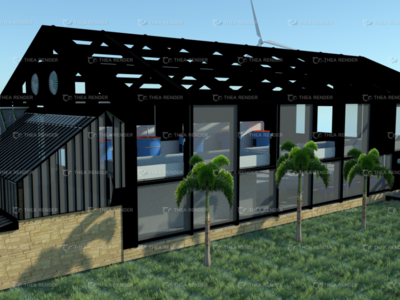
Q&A by Entrepreneurial Adaptation Prize Winner, Janaee Wallace
Part of the McCloskey Business Plan Competition ($5,000 for the most innovative solution related to global adaptation)
What is SIREN?
SIREN stands for STEM Innovations through Research and Entrepreneurship Now. It is a dream that I have that led me to the ESTEEM program. SIREN is my long-term goal to develop an accelerator and angel investment firm that focuses primarily on tech businesses throughout the Caribbean. SeaFresh Foods, my entrepreneurial venture is my personal venture that I hope to be the first business that SIREN develops. The ESTEEM program aims at commercializing technology and that is what I want SIREN to do. Using the business acumen I developed over the past year at the ESTEEM program I formulated a launch strategy for SeaFresh Foods, hoping that the success of this business would set a precedent for SIREN, and for individuals of Caribbean decent who would want to work with SIREN.
How did it evolve to a full business plan?
SeaFresh Foods was actually only an idea a year ago. When applying to the ESTEEM program last year, one of the prompts was to describe/explain an innovation or business idea that you had. Because I have always cared for and felt a strong need for sustainable development in my country, the Bahamas, I wanted to address one of our major issues -declining fish stocks-. Originally, the plan was to simply develop aquaculture farms in the Bahamas known as "Aquahouses" to supply the high fish demand, and curve the depletion rates. When I joined the ESTEEM program none of the "off the shelf" industry sponsor or university sponsored ventures spoke to me and with the support of my advisors I decided to do a founder's idea. Then, with the nature of the Notre Dame and ESTEEM program, they asked more of me how could I push the concept further. It was then that I began to think about the possibilities of marine aquaponics as a solution to 3 of the world's issues: water, food, and the declining fish stock.
What sort of climate impacts are or will affect the Bahamas?
In my opinion some of the biggest issues are:
- Rising sea levels; the Bahamas is not very high above sea levels and we will be very susceptible to the rising tides
- Coral bleaching; the Bahamas has one of the world's largest coral reef ecosystems. Ocean acidification will have a significant rippling affect on our natural ecosystems for food, our country's natural beauty, and ultimately our economy. Further, these reefs aid in coastal protection from natural phenomena
- Changing weather patterns; with the global temperature rising there is a heightened risk for increasingly intense natural phenomenons such as hurricanes, droughts, and flooding. A number of factors including topography and freshwater availability which are already at risk will be even more heavily affected.
- Less predictable food supply; as the needs for food globally shift and penetrate in more obvious ways even the most economically strong countries it is my opinion that there will be a significant shift in the share ability of food and water globally. Therefore countries like mine will need to become more self sufficient in order to feed their people.
What are the hopes for this project?
It is my hope that this project will aid in helping decrease the Bahamas' and the Caribbean in general's dependence on foreign entities for food. The systemic dependence on foreign countries seen throughout the Caribbean from the time Christopher Columbus landed on San Salvador, Bahamas to now -in my opinion- has been one of the biggest shortcomings to the Caribbean's development on the world stage. I would love to see my technology specifically implemented and utilized in the Bahamas and the Caribbean as a serious alternative to imported foods to aid in developing the region economically, but more importantly environmentally such that sustainable growth and development can be achieved as our country develops.
Janaee Wallace holds a B.S. in Biology with a minor in Chemistry and a strong focus on Environmental Science and Policy from St. Edward's University. She's currently persuing a M.S. in Engineering, Science, and Technology Entrepreneurship program at the University of Notre Dame.